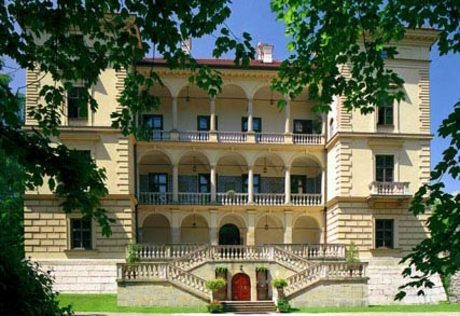Villa Decius
Krakow’s Villa Decius (Willa Deciusza), the Renaissance mansion built around 1530 for a powerful secretary of King Sigismund I the Old, is one of Poland’s best palatial suburban residences. Its first owner was one of the leading lights of the 16th-century Polish ‘Golden Age’.
Jost Ludwig Dietz came to Kraków from Hungary in 1508. Justus Ludovicus Decius- as this is how the Alsatian started to be called in Poland - was a protégé of his compatriot, Jan Jacob Boner, a royal banker, the founder and manager of the largest commercial empire in contemporary Europe - the Wieliczka and Bochnia salt mines. Through his positions as secretary, bookkeeper and trusted deputy, Decius quickly became a consummate diplomat, practised financier and a highly positioned royal dignitary. A secretary of King Sigismund the Old since 1520, and soon his advisor and the principal of crown mints, due to many talents, literary and historical dissertations, many journeys and scientific predilections, he enjoyed the respect and friendship of the most outstanding European humanists. He knew Martin Luther and Desiderius Erasmus. He also maintained close contacts with the Habsburg court. Already by 1519 he had obtained noble status from the King, and somewhat later he was received to the House of Tęczyński.
In 1528 Justus Decius purchased parts of Przegorzały and Wola Chełmska villages near Kraków in order to build a suburban villa following the example of a fashionable paradis terrestiare in the environs of Florence and Rome - estates that were meeting places and places of rest and philosophical debate. He employed three Italian architects for the designing and construction of building: Giovanni Cini of Siena, Zenobius Gianotti of Rome and Filippo of Fiesole. Located on the picturesque eastern slope of Sowiniec, surrounded by an extensive renaissance garden, the palace was completed in 1535. Soon it became the venue for meetings of representatives of different cultures and nationalities, the exchange of opinion and for creative confrontation between various convictions.
In the 19th century Princess Czartoryska, arts patron and a famed pianist, restored the palace to prominence. Now it shines again after a thorough renovation as Krakow’s home to the European Academy, inviting intellectuals from across the continent. The adjacent old Romanticist park boasts open-air musical events and a modern sculpture gallery. And the period interiors of the Decius Villa shelter also a modern Conference Center.


